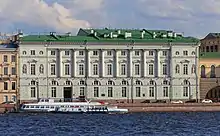| |||
|---|---|---|---|
Buildings and structures
|
The year 1787 in architecture involved some significant events in architectural history.
Events
- The Hameau de Chantilly, a group of cottages, is constructed by Bathilde d'Orléans, Duchess of Bourbon, in the gardens of the Élysée Palace in Paris, in imitation of a village at the Château de Chantilly, her principal residence.[1]
- The Royal Pavilion, at Brighton (England) is established as a seaside retreat for George, Prince of Wales. Extensive building work begins.[2]
Buildings and structures
Buildings completed
- United States:
- Charleston, South Carolina: the Unitarian Universalist Church (a National Historic Landmark).
- Bedford, New York: the Court House in Bedford Village (renovated in the 1960s), part of Bedford Village Historic District.
- White Plains, New York: the second courthouse, built on the foundation of the first (1759) courthouse.
- Philadelphia: the Morris House Hotel.
- Jefferson County, Ohio: Fort Steuben, housing the first American Army Regiment.

The Hermitage Theatre in Saint Petersburg, Russia
- The Hermitage Theatre, designed by Giacomo Quarenghi, in Saint Petersburg, Russia.
- The Museum of Natural History, later the Museo del Prado, in Madrid, Spain, designed by Juan de Villanueva (approximate date).
- Church of La Soledad, Mexico City, designed by Father Gregorio Pérez Cancio with the help of architects Cayetano de Sigüenza, Ildefonso Iniesta Bejarano, Francisco Antonio de Guerrero y Torres and Ignacio Castera.
- Al-Nabi Mosque, Qazvin (Persia), probably designed by Ustad Mirza Shirazi.
- Qingshui Temple in Taipei (Taiwan).
- Dome of the Sanctuary of Santa Maria della Vita, Bologna, Italy, designed by Giuseppe Tubertini.[3]
Buildings opened
- October 14 – Theater auf der Wieden, designed by Andreas Zach, in suburban Vienna, Austria[4]
Births
- January 26 – Aleksandr Vitberg, Russian Neoclassical architect (died 1855)
- November 26 – Pascal Coste, French architect and engineer working in Egypt (died 1879)
- date unknown
- Ignatius Bonomi, English architect (died 1870)
- John Dobson, English architect (died 1865)
- John Peter Gandy, English architect (died 1850)
Deaths
- April 7 – Sir Nigel Gresley, 6th Baronet, builder of Sir Nigel Gresley's Canal[5] (born c.1727)
- May 8 – Antonio Brianti, Italian architect (born 1739)
References
- ↑ Haynie, Henry (1902). Paris: Past & Present. Vol. 2. New York. p. 245.
{{cite book}}: CS1 maint: location missing publisher (link) - ↑ Morley, John (2003-12-05). The Making of the Royal Pavilion, Brighton: Design and Drawings. Philip Wilson Publishers. ISBN 978-0-85667-557-7.
- ↑ Nelson-Atkins Museum of Art; Eliot Wooldridge Rowlands (1996). The collections of The Nelson-Atkins Museum of Art: Italian paintings, 1300-1800. Nelson-Atkins Museum of Art. ISBN 9780942614251.
- ↑ Krzeszowiak, Tadeusz (2009) Freihaustheater in Wien: 1787-1801: Wirkungsstätte von W. A. Mozart und E. Schikaneder. Vienna: Böhlau Verlag. ISBN 3-205-77748-4. page 78
- ↑ "Sir Nigel Gresley's Canal". Jim Shead. Archived from the original on 2012-12-26. Retrieved 2007-05-06.
This article is issued from Wikipedia. The text is licensed under Creative Commons - Attribution - Sharealike. Additional terms may apply for the media files.